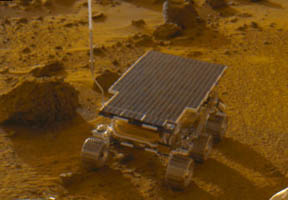
The Sojourner rover explores Ares Vallis, Mars.
(Image credit: Pathfinder Imaging Team)
12.004 Subject Information, Spring 2003
[Overview |
Subject Requirements |
Subject Outline at a Glance ]
12.004 encompasses study of the solar system with emphasis on physical
processes. Conceptual analysis will be supported with observational
information, with particular attention to data collected from recent
and current planetary spacecraft. 12.004 is a department core subject
typically taken by sophomores and juniors in EAPS, especially those
concentrating in planetary science, and also by sophomores, juniors,
and seniors from other departments, often as part of the EAPS minor
program.
We have given a graduate number to this course, 12.601, to accomodate
graduate students who are interested in a physical introduction to
planetary science. Graduate students are graded separately, given
extra problems, and have one extra class meeting per week to discuss
short papers from the recent literature.
Lecturers
-
-
-
Class Meetings
-
- Lectures: MWF 11:00-12:00 in 54-317.
Texts
-
-
Prof. Maria Zuber's class notes downloadble from website.
-
Planetary Sciences,
Imke de Pater and Jack J. Lissauer, 2001.
- Physics and Chemistry of the Solar System, Lewis, 1998.
Prerequisites
-
8.02
and
18.03
Grading
- Your subject grade will be based on class participation, homework, and a final
oral report on a panetary science subject of your choosing.
Subject Policies
-
- As a good deal of the material that will be covered is too new to
be be incorporated in text books (and sometimes even class notes),
attendance in lectures is strongly encouraged. You are responsible for
the material presented in class, as well as in assigned reading.
- Collaboration with others (not copying) on homework is OK after a
serious individual attempt has been made to solve each problem.
Collaborating doesn't affect your homework grade,
but on your homework you must explicitly identify
with whom and to what extent you collaborated.
- Use of previous terms' homework solutions will result in no credit.
- Any one late homework is acceptable; otherwise late homework gets no credit.
(This is so you don't fall behind!)
Overview
Formation of the Solar System
- condensation and cooling
- accretion
- differentiation
- other planetary systems
Meteorites
- age of the solar system
- classes, compositions
- early heat sources
Asteroids
- physical properties
- taxonomy
- families
Comets
- structure and composition
- orbits
- reservoirs
Kuiper Belt
- discovery
- populations
- Pluto/Charon
Impact Cratering
- cratering mechanics
- impact crater morphology
- impactor populations
- Tunguska
- K-T extinction
- Shoemaker-Levy-9
- cratering timescales
Dynamics
- the two-body problem
- Kepler's Laws
- orbital energy
- tides
- resonances
- chaotic orbits
Planetary Atmospheres
- radiative transfer
- structure and composition
- dynamics
Planetary Interiors
- gravity, moments
- magnetics
- mechanisms of heat transport
- giant planets
Surfaces
- Moon and Mercury
- Venus and Earth
- Mars
- Outer satellites
Planetary Rings
- characteristics
- compositions
- dynamics
